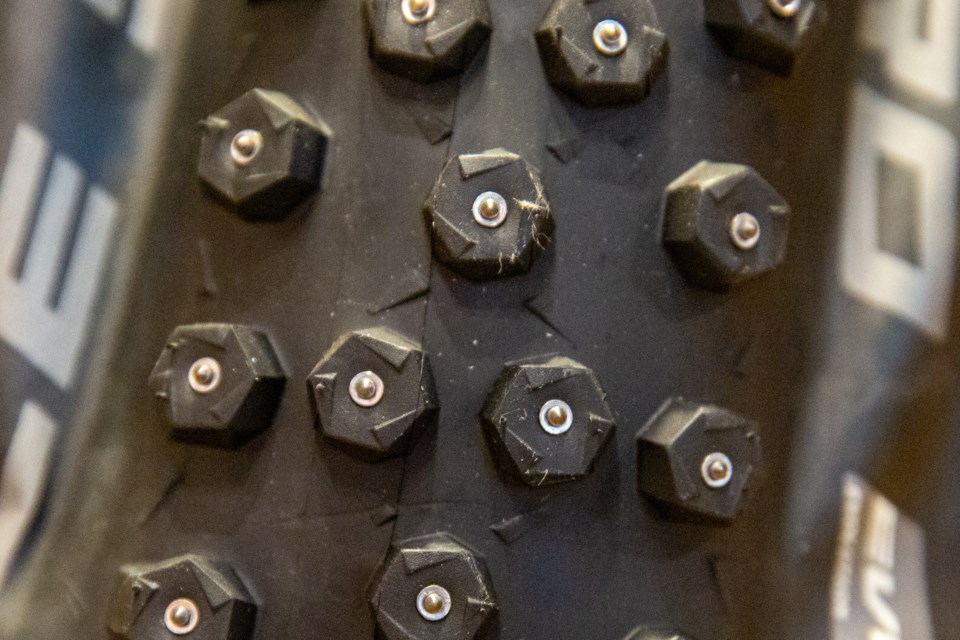BANFF – The Town of Banff is wheeling out its studded bike tire rebate as a permanent program each winter to encourage residents to ride around town.
On Monday (Dec. 7), council approved the $40 rebate per tire, but also added a $40 rebate for a tire conversion kit based on public requests. The $20 walking aid rebate, offered for the first time last year, was also approved again.
“The studded tire and walking aid rebate have both been very popular,” said Michael Hay, the municipality’s environment and sustainability manager, during the council meeting.
“I have received a number of calls, and other staff have received calls, about when and whether or not we’ll be offering the studded and walking aid rebates for the past few months. There is still a lot of interest in those programs.”
In 2018-19, 49 people applied for the tire rebate, which cost $4,977. The following winter, the Town of Banff handed out $3,000 worth of rebates to cover 36 applications.
The $20 snow and ice walking aid rebate saw 41 applications in 2019-20 – the first winter this is rebate was offered.
The general rebate for tires is $40 per tire, however the rebate was $60 per tire for members of the Banff Access Program, which provides qualified low-income applicants with discounts on community services and products.
Hay said no applications were received from members of that program.
“The two-tiered rebate was seen as confusing by some applicants, so it is suggested that this aspect of the offering be removed," he said.
Hay said survey data shows most applicants are using the studded tires and walking aids for commuting.
“That’s great. We’re really trying to drive up active transportation for commuting,” he said.
“The next time we get around to doing a municipal census, we’ll see if the two rebates have had an impact on that in winter time.”
The environmental rebate program is funded through Banff’s environmental reserve, which is continually replenished by franchise fees collected on electricity bills paid by residents and businesses.
The annual cost for the municipality to offer the program varies depending on the number of applicants for the various types of rebates, but is typically about $15,000 a year.
The program was suspended in April this year as part of budget cuts related to the Town’s COVID-19 emergency response efforts. It resulted in a savings of about $10,000 in 2020.
“Not a great deal, but still something,” Hay said. “We have, of course, continued to collect those franchise fees during the pandemic so we’re still bringing in new money from residents and businesses.”
Administration presented proposed changes to the program – established in 2007 to provide financial incentives to residents and businesses to buy environmentally-friendly products.
The environmental rebate program is schedule to restart on Jan. 1, 2021, but Hay said some changes were needed to address a few shortcomings.
He said some of the municipal rebates were reduced or eliminated in 2017 to better align with rebates offered under Alberta’s energy efficiency plan from 2017-19.
“The provincial rebate program has now been discontinued, so the Town’s program is in need of an update,” he said.
“Additionally, most of the rebate amounts were set more than a decade ago and should be adjusted to keep pace with inflation”
The program also needs to catch up to evolving energy efficiency rating systems, market trends and updated building codes.
“Some rebates have also seen little participation – or none at all – suggesting that some rebate amounts do not constitute an effective financial incentive,” Hay said.
Some of the rebates available in Banff include toilets, clothes-washers, dishwashers, refrigerators, and energy efficient door and window replacements.
There are no changes to the furnace and solar hot water heater rebate at this time.
The rain barrel rebate, however, was increased to reflect a decade of inflation and boost participation – and will now be offered to commercial applicants.
In addition, rebates for home energy audits have been changed to match the commercial energy audit rebate, at one-third of cost.
Hay said the commercial energy audit has also been expanded to include greenhouse gas emission inventories to encourage businesses to evaluate their overall carbon footprint and to include fleet vehicles in their analysis.
“A maximum rebate amount of $5,000 is suggested for commercial applicants,” he said.




